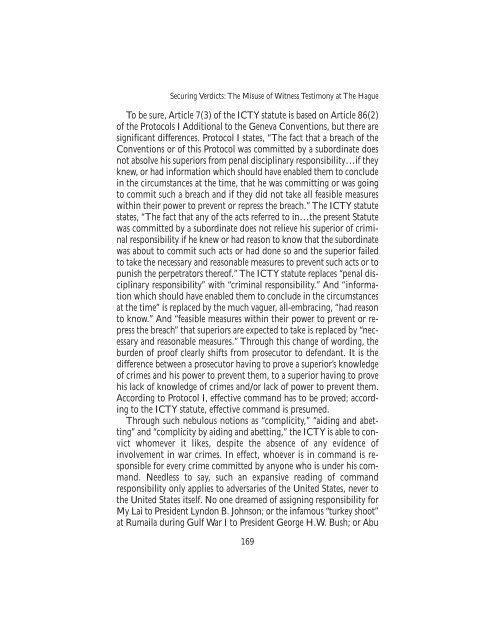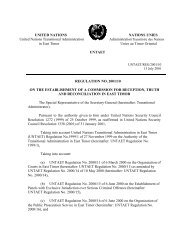The Srebrenica Massacre - Nova Srpska Politicka Misao
The Srebrenica Massacre - Nova Srpska Politicka Misao
The Srebrenica Massacre - Nova Srpska Politicka Misao
You also want an ePaper? Increase the reach of your titles
YUMPU automatically turns print PDFs into web optimized ePapers that Google loves.
Securing Verdicts: <strong>The</strong> Misuse of Witness Testimony at <strong>The</strong> Hague<br />
To be sure, Article 7(3) of the ICTY statute is based on Article 86(2)<br />
of the Protocols I Additional to the Geneva Conventions, but there are<br />
significant differences. Protocol I states, “<strong>The</strong> fact that a breach of the<br />
Conventions or of this Protocol was committed by a subordinate does<br />
not absolve his superiors from penal disciplinary responsibility…if they<br />
knew, or had information which should have enabled them to conclude<br />
in the circumstances at the time, that he was committing or was going<br />
to commit such a breach and if they did not take all feasible measures<br />
within their power to prevent or repress the breach.” <strong>The</strong> ICTY statute<br />
states, “<strong>The</strong> fact that any of the acts referred to in…the present Statute<br />
was committed by a subordinate does not relieve his superior of criminal<br />
responsibility if he knew or had reason to know that the subordinate<br />
was about to commit such acts or had done so and the superior failed<br />
to take the necessary and reasonable measures to prevent such acts or to<br />
punish the perpetrators thereof.” <strong>The</strong> ICTY statute replaces “penal disciplinary<br />
responsibility” with “criminal responsibility.” And “information<br />
which should have enabled them to conclude in the circumstances<br />
at the time” is replaced by the much vaguer, all-embracing, “had reason<br />
to know.” And “feasible measures within their power to prevent or repress<br />
the breach” that superiors are expected to take is replaced by “necessary<br />
and reasonable measures.” Through this change of wording, the<br />
burden of proof clearly shifts from prosecutor to defendant. It is the<br />
difference between a prosecutor having to prove a superior’s knowledge<br />
of crimes and his power to prevent them, to a superior having to prove<br />
his lack of knowledge of crimes and/or lack of power to prevent them.<br />
According to Protocol I, effective command has to be proved; according<br />
to the ICTY statute, effective command is presumed.<br />
Through such nebulous notions as “complicity,” “aiding and abetting”<br />
and “complicity by aiding and abetting,” the ICTY is able to convict<br />
whomever it likes, despite the absence of any evidence of<br />
involvement in war crimes. In effect, whoever is in command is responsible<br />
for every crime committed by anyone who is under his command.<br />
Needless to say, such an expansive reading of command<br />
responsibility only applies to adversaries of the United States, never to<br />
the United States itself. No one dreamed of assigning responsibility for<br />
My Lai to President Lyndon B. Johnson; or the infamous “turkey shoot”<br />
at Rumaila during Gulf War I to President George H.W. Bush; or Abu<br />
169



